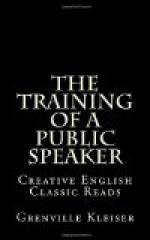THE QUALITIES NEEDED FOR SUCCESS
The narration will be clear and intelligible if, first, it be exprest in proper and significant words, which have nothing mean and low, nothing far-fetched, and nothing uncommon. Second, if it distinguishes exactly things, persons, times, places, causes; all of which should be accompanied with a suitable delivery, that the judge may retain the more easily what is said.
This is a quality neglected by most of our orators, who, charmed by the applause of a rabble brought together by chance, or even bribed to applaud with admiration every word and period, can neither endure the attentive silence of a judicious audience, nor seem to themselves to be eloquent unless they make everything ring about them with tumultuous clamor. To explain simply the fact, appears to them too low, and common, and too much within the reach of the illiterate, but I fancy that what they despise as easy is not so much because of inclination as because of inability to effect it. For the more experience we have, the more we find that nothing else is so difficult as to speak in such a manner that all who have heard us may think they could acquit themselves equally as well. The reason for the contrary notion is that what is so said is considered as merely true and not as fine and beautiful. But will not the orator express himself in the most perfect manner, when he seems to speak truth? Now, indeed, the narration is laid out as a champion-ground for eloquence to display itself in; the voice, the gesture, the thoughts, the expression, are all worked up to a pitch of extravagance, and what is monstrous, the action is applauded, and yet the cause is far from being understood. But we shall forego further reflections on this misguided notion, lest we offend more by reproving faults, than gratify by giving advice.
The narration will have its due brevity if we begin by explaining the affair from the point where it is of concern to the judge; next, if we say nothing foreign to the cause; and last, if we avoid all superfluities, yet without curtailing anything that may give insight into the cause or be to its advantage. There is a certain brevity of parts, however, which makes a long whole: “I came to the harbor, I saw a ship ready for sailing, I asked the price for passengers, I agreed as to what I should give, I went aboard, we weighed anchor, we cleared the coast, and sailed on briskly.” None of these circumstances could be exprest in fewer words, but it is sufficient to say, “I sailed from the port.” And as often as the end of a thing sufficiently denotes what went before, we may rest satisfied with it as facilitating the understanding of all other circumstances.




